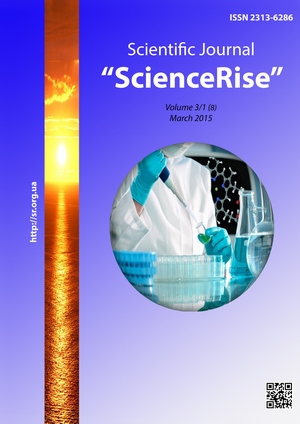Дидактичні засади формування інтелектуальних якостей молодших школярів
DOI:
https://doi.org/10.15587/2313-8416.2015.39152Słowa kluczowe:
молодший школяр, культура інтелектуальна діяльність, організація навчання, диференціація, інтегровані урокиAbstrakt
У роботі проаналізовано загальні тенденції в організації навчального процесу в початковій школі в традиційній системі навчання та в інноваційних авторських програмах, що безпосередньо впливають на формування інтелектуальних якостей молодших школярів. Визначено продуктивні напрями організації навчальної та позаурочної діяльності, які доцільно використовувати в процесі формування культури інтелектуальної діяльності учнів початкової школи
Bibliografia
Davydov, V. V. (1996). Teorija razvivajushhego obuchenija [The theory of developmental education]. Moscow: Intor, 544.
Repkin, V. V., Repkina, N. V. (1997). Razvivajushhee obuchenie: teorija i praktika [Developing education: theory and practice]. Tomsk: Peleng, 288.
Jel'konin, D. B. (1989). Izbrannye psihologicheskie trudy [Selected psychological works]. Moscow: Pedagogy, 560.
Gal'perin, P. Ja. (1985). Metody obuchenija i umstvennoe razvitie rebjonka [Methods of training and mental development of the child]. Moscow, 45.
Amonashvili, Sh. A. (1995). Razmyshlenija o gumannoj pedagogike [Reflections on humane pedagogy]. Moscow: Publishing Home of Shalva Amonashvyly, 496.
Gel'fman, Je. G., Holodnaja, M. A. (2006). Psihodidaktika shkol'nogo uchebnika. Intellektual'noe vospitanie uchashhihsja [Psihodidaktika of school textbook. Intellectual education of students]. St. Petersburg: Peter, 384.
Savchenko, O. Ia. (2011). Rozvytok zmistu pochatkovoi osvity v umovakh Derzhavnoho suverenitetu Ukrainy: metodolohichnyi, zakonodavchyi, dydaktychnyi aspekty [The development of elementary education content in terms of State Sovereignty of Ukraine: methodological, legislative, didactic aspects]. Elementary School, 8, 25–29.
Komar, O. A. (2010). Interaktyvna tekhnolohiia v pidhotovtsi maibutnikh uchyteliv pochatkovoi shkoly: teoriia i praktyka [Interactive technology in training of primary school teachers: Theory and Practice]. Uman: Yellow, 326.
Pometun, O. I. (2002). Interaktyvni tekhnolohii navchannia: teoriia, praktyka, dosvid [Interactive learning technologies: theory, practice and experience]. Kyiv: A.P.N., 136.
Pometun, O., Pyrozhenko, L. (2003). Suchasnyi urok. Interaktyvni tekhnolohii navchannia [The modern lesson. Interactive learning technologies]. Kyiv: A.S.K., 192.
Ushinskij, K. D. (1968). Izbrannye pedagogicheskie proizvedenija [Selected pedagogical works]. Moscow: Education, 557.
Sukhomlynskyi, V. O. (1976). Problemy vykhovannia vsebichno rozvynenoi osobystosti [Problems of education fully developed personality]. Kyiv: Soviet school, 1st ed, 53–206.
Masol, L. M. (2006). Zahalna mystetska osvita: teoriia i praktyka [General art education: Theory and Practice]. Kyiv: Ray, 432.
Shatalov, V. F. (1990). Tochka opory. Organizacionnye osnovy jeksperimental'nyh issledovanij [Fulcrum. Organizational basis of experimental studies]. Moscow: University, 224.
Lysenkova, S. N. (1988). Metodom operezhajushhego obuchenija [The method of advancing education]. Moscow: Education, 192.
Jerdniev, P. M., Jerdniev, B. P. (1986). Ukrupnenie didakticheskih edinic [Integration of didactic units]. Moscow: Prosveschenie, 254.
Chupakhina, S. (2007). Pidhotovka pedahoha do otsiniuvannia navchalnykh dosiahnen suchasnykh pershoklasnykiv [Preparing teachers to the evaluation of educational achievements of modern first graders]. Scientific Bulletin of Chernivtsi University: Pedagogy and Psychology. Chernivtsi: Ruta, 330, 185-190.
Sidorchuk, T. A. (2001). TRIZ – pedagogicheskaja sistema tret'ego tysjacheletija [TRIZ - pedagogical system of the third millennium]. Education Without Borders, 1, 81–83.
Dusavickij, A. K. (2002). Razvivajushhee obrazovanie: teorija i praktika [Developmental Education: Theory and Practice]. Kharkov: KhSU, 116.
Novikov, A. M. (2005). Metodologija uchebnoj dejatel'nosti [Methodology of training activities]. Moscow: Egves, 176.
##submission.downloads##
Opublikowane
Numer
Dział
Licencja
Copyright (c) 2015 Інна Анатоліївна Романова

Utwór dostępny jest na licencji Creative Commons Uznanie autorstwa 4.0 Międzynarodowe.
Our journal abides by the Creative Commons CC BY copyright rights and permissions for open access journals.
Authors, who are published in this journal, agree to the following conditions:
1. The authors reserve the right to authorship of the work and pass the first publication right of this work to the journal under the terms of a Creative Commons CC BY, which allows others to freely distribute the published research with the obligatory reference to the authors of the original work and the first publication of the work in this journal.
2. The authors have the right to conclude separate supplement agreements that relate to non-exclusive work distribution in the form in which it has been published by the journal (for example, to upload the work to the online storage of the journal or publish it as part of a monograph), provided that the reference to the first publication of the work in this journal is included.

